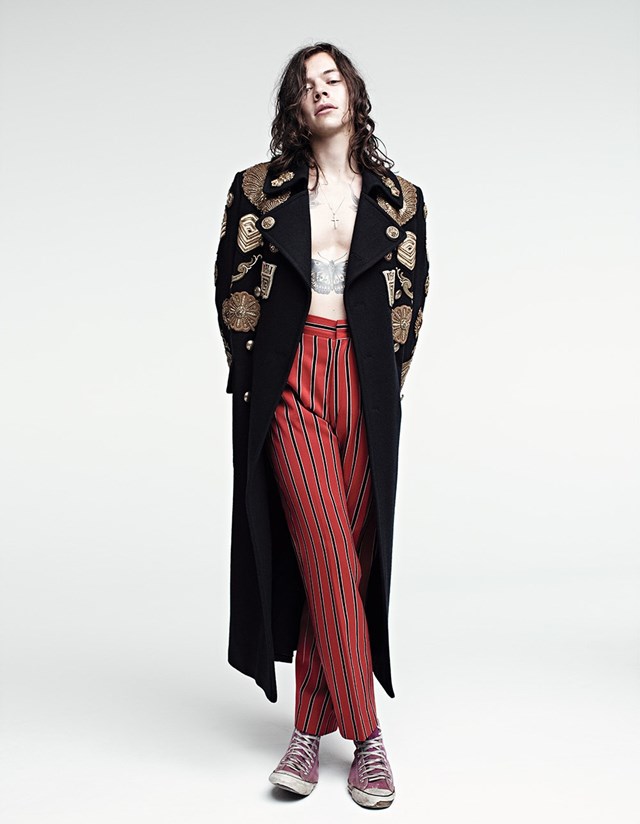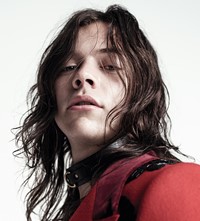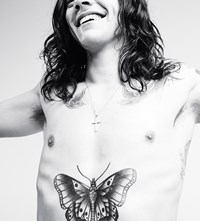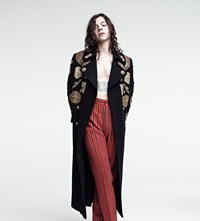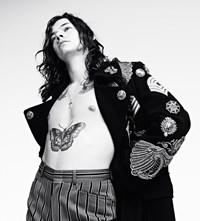Harry Styles vs Paul McCartney
- TextPaul McCartney
- PhotographyWilly Vanderperre
- StylingAlister Mackie
Harry telephones Sir Paul McCartney for a masterclass in surviving fame, staying grounded and the secret to going solo
Taken from the A/W16 issue of Another Man:
PAUL McCARTNEY: Is that you Harry?
HARRY STYLES: It’s me.
Another Man: Paul, Harry’s making the transition from this intense experience of being in a group to striking out on his own – do you have any advice for him at this point?
PM: It’s a difficult one because being in the group you’ve got the strength of the union, but you’ve also got the disagreements. So when you leave that union and you’re on your own, it’s like leaving home. But you can also make decisions yourself a bit easier. I don’t know about advice, but I suppose it is just the same old one: be true to yourself, do what you think is right, that’s all I’d say.
AM: You’ve both been surrounded by fan mania – can you remember the first moment of madness when you realised everything had changed?
PM: In the early days when we first had a bit of money, I used to go on holiday to Greece, to Corfu, and nobody knew who we were, whereas back in England they knew who we were. So it was very peaceful in Greece and I remember going round the back of the hotel and seeing the hotel band rehearsing and I’d hang out with them. But I was having to persuade them that I was somebody back in England, I’d say, ‘I’m in a group, you know!’ and they were going, ‘Yeah, yeah, ok’, they had no interest at all. And I thought, this is great, because I can always come to Greece and escape, because they’ll never know who I am. And then the next time I went back to Greece, they all knew who I was, so that was that little bolthole blown. I think that’s the first time I realised, ‘Oops, this has gone crazy’.
HS: I really just go home most of the time. My parents still live where I grew up so that’s one of the places for me where I feel like I disappear the most, if that’s what I’m in need of. I go back to Cheshire a lot and walk around the same fields and it’s one of the things that isn’t going to change, no matter what happens. It’s nice to have stuff like that where it’s no different from it was when I was ten. I’m lucky that I still have a base up there.
PM: It’s the same for me with Liverpool, going back up and seeing your family. You may be famous, but to them you’re still ‘our Paul’. It grounds you, and I go for the same walks I used to when I was a kid.
HS: If you can step outside of the craziness and appreciate it for the fact that it’s extraordinary, see it as this amazing thing for a second, it’s alright. If you just think that’s how life is, that’s when you lose touch. It’s good to have people who can tell you you’re an idiot and tell you when you’re wrong. I think that’s as important as having people geeing you up sometimes. Going home is probably always the answer.
PM: Yeah I’ll go along with that. In fact, I’ll come home with you Harry.
HS: My mum would love it.
PM: In my Liverpool family, nobody’s special. The older aunties and uncles and parents were the only people in the family who were remotely special and the kids weren’t anything. Even when I got famous with the Beatles, it was just, ‘Alright Paul, how you doing? Have a bevvy’, and you go, ‘Yeah ok, go on!’ It just reminded you who you are, who you were, and I would always come away from visiting Liverpool refreshed. I felt, this is great; I’m ‘me’ again.
AM: What’s the strangest thing a fan has ever done to get your attention?
PM: Coming into your hotel bedroom uninvited was pretty good. Quite a few incidents come to mind, but when we were in Miami this girl came into the bedroom who turned out to be a Playboy Bunny. I thought, ‘Wow, this is great.’ But it wasn’t. A lot of these things happen, hopefully you forget most of them.
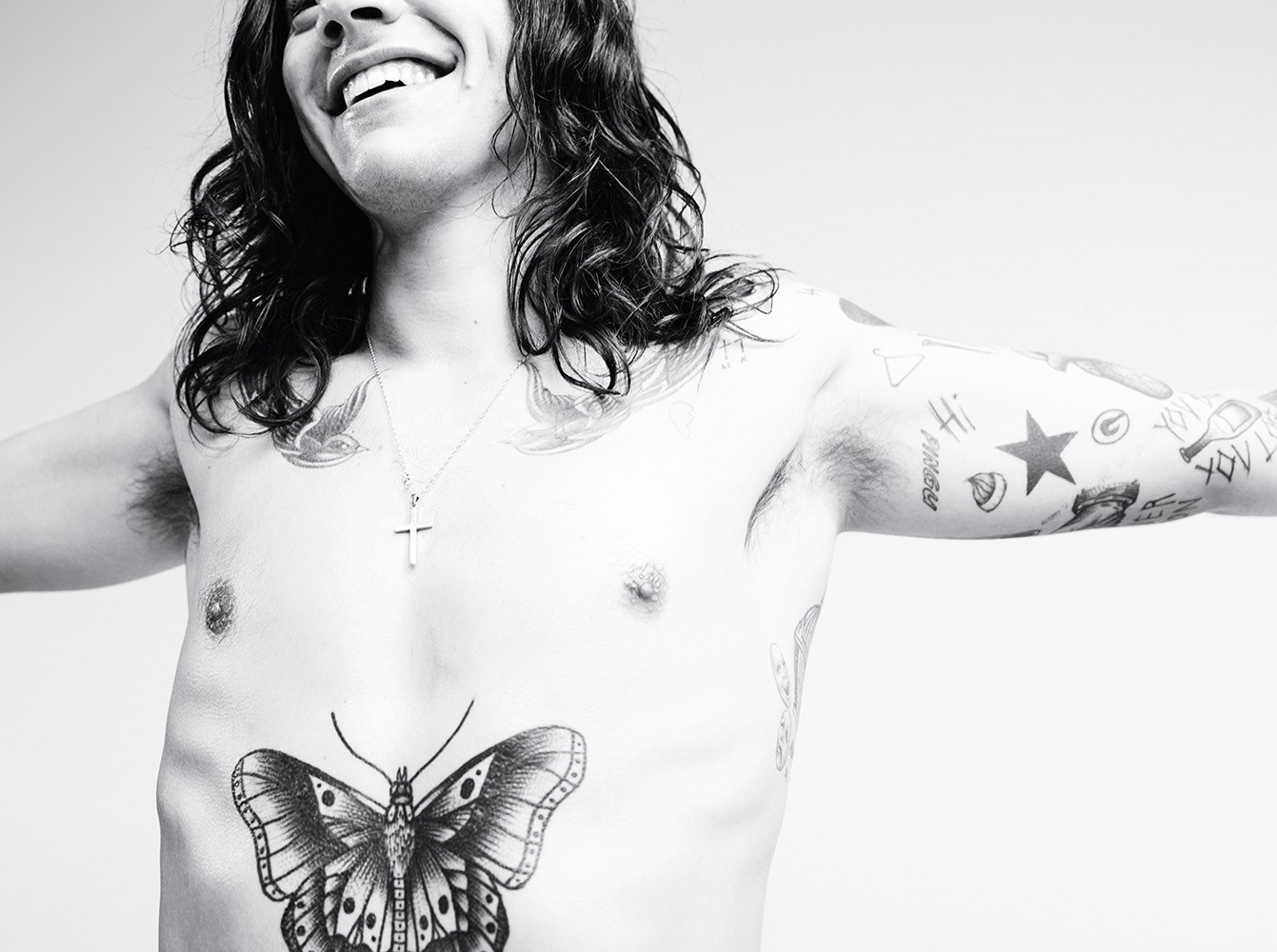
HS: Can I ask you a question? When you first went from being in a band to being on your own, what was the creative side of that like? There’s obviously so much knowledge of who you were when you were in this group, did you find it at all difficult to think, ‘If I do anything different is it going to be right?’ How did you approach that first creative experience?
PM: Yeah, well actually when the Beatles broke up, I was in the process of writing some stuff. So I just did something very simple, which was the first album I ever did solo called McCartney and it was just done in the front room sort of thing, really simple. I just had to get it out of my system. So I didn’t really think too much about it, I just did it. But then going on, there was this difficulty – you’re thinking, ‘Well, now what am I going to do, just make records that sound like the Beatles? Or, am I going to try and go in a completely different direction and do something that’s really not like the Beatles?’ So we started the group Wings, and then I just thought, ‘Sod it, I’m going to write some stuff that I want to write and keep it away from what the Beatles might have done with it.’ Once that was established with a few hits of our own, like Jet and Band on the Run and things like that, then I thought it was okay to do Beatles stuff again, because I’d proved my point to myself. These days I do lots of Beatles things, it doesn’t matter any more, I’m happy to do anything. But at first it was a little bit diffi cult, I must admit.
HS: The nice thing for me is that I’m not coming away from the band feeling like I wasn’t able to do what I wanted to do. I loved it and it was what I wanted but I’m enjoying writing at the moment; trying new things. I’ve been asking myself, ‘What do I want to say?’
PM: It’s a good time in your life, after you’ve left something big and famous and now you’re actually doing your own thing, it can be great. I’m glad you’re enjoying it.
HS: Thanks! Are you on the road at the moment?
PM: Yeah, I’m actually going to Norway tomorrow night and then I’m doing a thing for Children in Need, which is the complete opposite. The Norway thing is a big stadium and then the night after is like a little pub gig, the smallest stage I’ve been on. Which is good fun, I like switching it up like that. So yeah, I’m still out and about.
HS: How did you find going from touring with so many people around you, to going out doing songs you’d written every word of and doing it that way?
PM: It was good really, because there was the freedom. When I was in the group, everything was done for you. You’re living in the bubble. And it’s kind of nice but you can get a bit fed up with it.
HS: Like you said, it’s this bubble where things happen around you and it’s not real life. It’s amazing but it’s not realistic. So when you come out of that it’s nice to catch up with everything.
PM: Yeah, it’s good to get back to reality.
